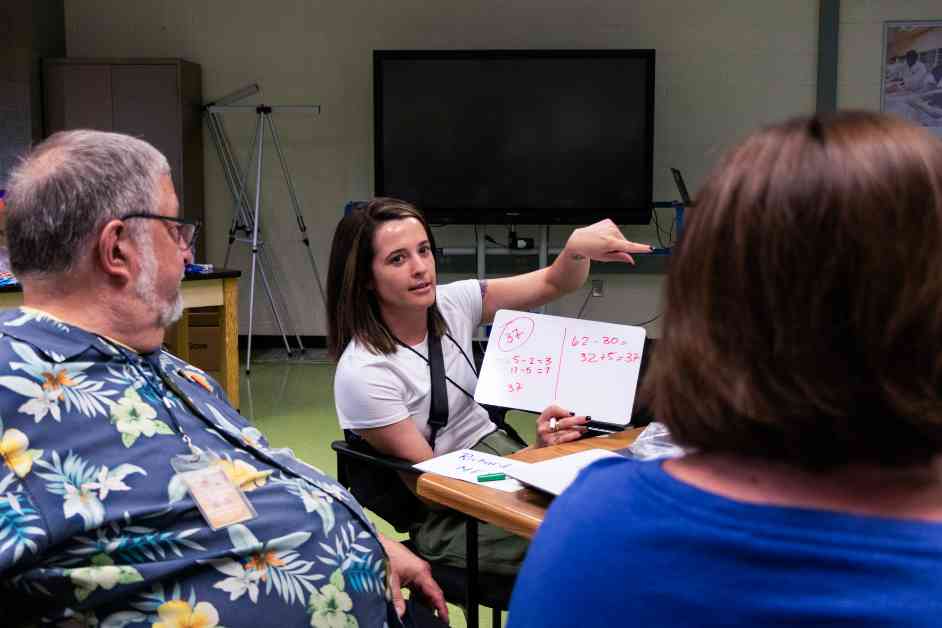Milwaukee Teachers Working to Revive Successful Early Grade Math Curriculum
In a professional development session on math teaching, first grade teacher Kayla Thuemler from Milwaukee demonstrated how she solved a subtraction problem. This session aimed to showcase successful math strategies used in the district from 2004-2014, known as the “golden years of math instruction.” This initiative is part of an effort by a small group of teachers to bring back the effective methods that were once implemented in Milwaukee schools.
The Golden Years of Math Instruction: A Two-Pronged Accountability Structure
During the “golden years of math instruction,” Milwaukee schools implemented a unique accountability structure that proved to be highly effective. This structure consisted of a hierarchy involving university professors, district administrators, teacher leaders, and classroom teachers. This collaboration ensured that educators in the field were connected with the latest research in math pedagogy, bridging the gap between theory and practice.
One of the key components of this accountability structure was the oversight of funding by university professors. A significant amount of $20 million was allocated specifically for improving math instruction, preventing the funds from being redirected to other priorities within the school district. This focused investment in math education contributed to the success of the program during those years.
The Role of the University Partnership in Math Instruction
Central to the success of the math instruction model was the partnership between the school district and the University of Wisconsin-Milwaukee. This collaboration provided a strong foundation for teacher training and professional development, ensuring that educators were equipped with the necessary tools to teach math effectively. However, when the partnership ended a decade ago, the district reverted to using its own in-house math curriculum.
Despite the absence of the university partnership, educators in the district are determined to keep the “golden years of math instruction” alive. DeAnn Huinker, the University of Wisconsin professor who previously oversaw the partnership, continues to conduct teacher trainings. Additionally, former teachers who were part of the program in the early 2000s now hold leadership positions within the district, allowing them to continue the work on a smaller scale.
Benefits for Teachers and Students
One of the notable outcomes of the math instruction model in Milwaukee was the positive impact on both teachers and students. Many educators found themselves enjoying math and becoming more comfortable with the subject, leading to improved teaching practices. By focusing on ensuring that teachers understand the math concepts thoroughly, the program emphasized that when teachers learn, students learn as well.
However, there was some resistance to teaching math in this way, particularly from educators who preferred a more procedural approach. The debate between emphasizing concepts versus procedures in math education continues to be a point of contention among educators. Despite this pushback, the success of the math instruction model in Milwaukee demonstrates the value of prioritizing conceptual understanding in math teaching.
Targeting Early Childhood Educators for Math Training
In recent years, Milwaukee Public Schools have placed a strong emphasis on training early childhood educators in math instruction. Many of these teachers initially pursued elementary teaching because they did not consider themselves “math people.” However, through targeted training and professional development, these educators are reevaluating their perceptions of math and learning how to effectively engage young learners.
The focus on early childhood educators reflects a strategic approach to improving math instruction from the foundation. By equipping teachers with the skills and knowledge to teach math effectively at a young age, the district aims to build a solid math foundation for students as they progress through their education.
Supporting Quality Education Reporting
This article highlights the efforts of Milwaukee teachers to revive a successful early grade math curriculum that was once the hallmark of the district’s math instruction. The dedication of educators to continue implementing proven strategies and the ongoing support for professional development underscore the importance of investing in quality education reporting.
The Hechinger Report, a nonprofit news organization focused on inequality and innovation in education, provides in-depth and unbiased reporting on critical issues in the education sector. By supporting organizations like The Hechinger Report, we can ensure that educators and the public are informed about pressing issues in schools and on campuses nationwide. Join us in advancing quality education reporting and promoting excellence in teaching and learning.

